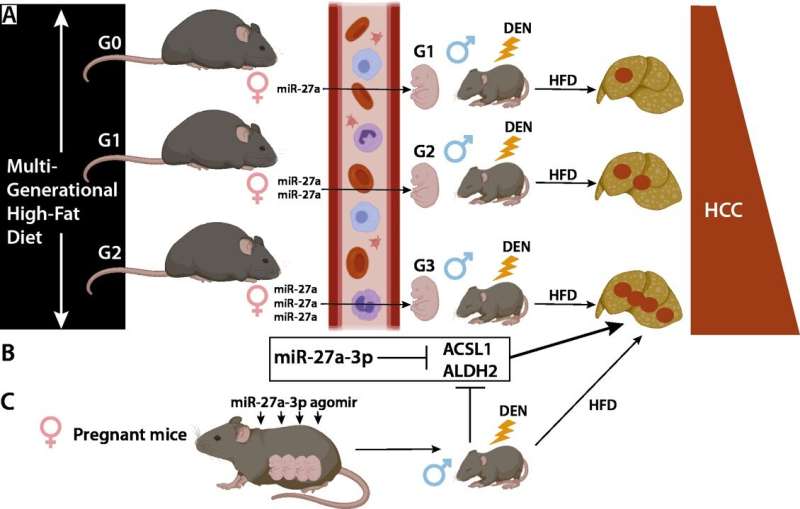Maternal obesity increases the chance of liver cancer in offspring for generations

Scientists recognize the connection between maternal obesity and liver cancer in the offspring of obese mothers, however, the mechanism is not well understood. In a novel study, appearing in the Journal of Hepatology, investigators have identified a microRNA in obese mouse mothers that appears to pass on liver cancer susceptibility, increasing the odds of liver cancer developing in their offspring and throughout future generations.
One third of the world population is overweight or obese and this global obesity epidemic is threatening human health. Obesity confers a higher risk of developing metabolic diseases such as non-alcoholic fatty liver disease (NAFLD) and hepatocellular carcinoma (HCC). Up to 50 percent of recently diagnosed HCC in the United States is the result of hepatic metabolic disorders such as NAFLD.
"Maternal obesity, which directly affects the health of the offspring, plays a critical role in the obesity epidemic and metabolic diseases," explained lead investigators Ling Zheng, Ph.D., College of Life Sciences, Wuhan University, Wuhan, China, and Kun Huang, Ph.D., Tongji School of Pharmacy, Tongji Medical College, Huazhong University of Science and Technology, Wuhan, China. "Epidemiological studies show that obesity is an independent risk factor for liver cancer. Our study provides insights into the question of whether and how maternal obesity affects tumor incidence in offspring."
Investigators administered diethylnitrosamine (DEN) to induce liver cancer in obese mice that had been fed a high-fat diet. RNA sequencing was performed to identify the genes and microRNAs that altered over generations. They found that injecting pregnant mice with the microRNA miR-27a-3p not only increased hepatic miR-27a-3p and reduced the expression of two genes, Acsl1 and Aldh2 in offspring (fetus, young, and adult stages), but also exacerbated HCC development in DEN-treated offspring.
High-fat diet-induced maternal obesity caused susceptibility of offspring to DEN-induced HCC, and the investigators established that this susceptibility was cumulative over generations. Furthermore, the odds for developing liver cancer increased intergenerationally. For example, the severity in the offspring of an obese mother and grandmother was higher than the offspring of an obese mother but normal-weight grandmother.
The investigators also analyzed human samples of HCC. "Our findings provide a mechanistic link between maternal obesity and the development of diseases in offspring, which will be helpful in exploring therapies and preventions for fetal- and developmental-originated diseases," noted Professor Huang.
"For pregnant mothers, the serum level of miR-27a-3p is critical for the offspring's health and may be used in future as a diagnostic or predictive biomarker," commented Professor Zheng. "We would therefore like to call for a global effort on maternal multigenerational obesity in humans to better address this common problem we are facing."
In an accompanying editorial, Sabine Colnot, Ph.D., Cordeliers Research Center, INSERM UMRS 1138, Paris, France, and André Lechel, Ph.D., Department of Internal Medicine I, University Hospital Ulm, Ulm, Germany, commented, "This study opens a new avenue for cancer research at the crossroads of metabolism and epigenetics. It brings new information on how maternal stress could influence its progeny, with consequences for HCC development. The mode of inheritance is not a classical intergenerational one. It is multigenerational, as the susceptibility to HCC gradually increases over generations."
More information: Yu Sun et al, Multigenerational maternal obesity increases the incidence of HCC in offspring via miR-27a-3p, Journal of Hepatology (2020). DOI: 10.1016/j.jhep.2020.03.050

















